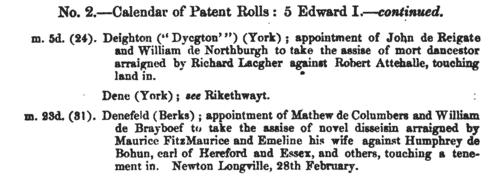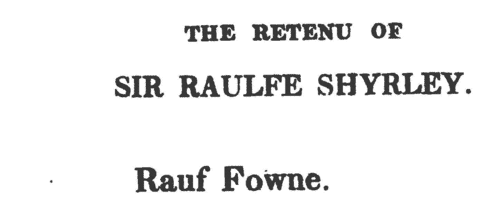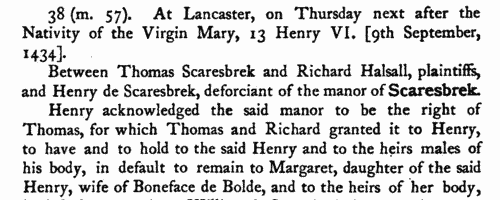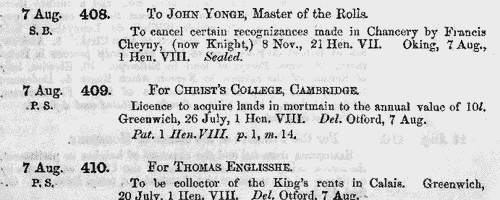Penyngton Surname Ancestry ResultsOur indexes 1000-1999 include entries for the spelling 'penyngton'. In the period you have requested, we have the following 19 records (displaying 1 to 10): Buy all | | | Get all 19 records to view, to save and print for £80.00 |
These sample scans are from the original record. You will get scans of the full pages or articles where the surname you searched for has been found. Your web browser may prevent the sample windows from opening; in this case please change your browser settings to allow pop-up windows from this site. Patent Rolls: entries for Wales
(1276-1277)
Calendars of the patent rolls of the reign of king Edward I are printed in the Calendars of State Papers: but these cover only a fraction of the material on the rolls. From 1881 to 1889 the reports of the Deputy Keeper of the Public Record Office also include calendars of other material from the rolls - about five times as many entries as in the State Papers - predominantly mandates to the royal justices to hold sessions of oyer and terminer to resolve cases arising locally; but also other general business. The calendar for the 5th year of king Edward I [20 November 1276 to 19 November 1277], hitherto unindexed, is covered here. Many of the entries are letters of protection for English knights and soldiers campaigning in Wales.PENYNGTON. Cost: £6.00.  | Sample scan, click to enlarge

| Grantees of offices, commissions and pardons
(1272-1281)
The Patent Rolls are the Chancery enrolments of royal letters patent. Those for the 1st to the 9th years of the reign of king Edward I (29 November 1272 to 17 November 1281) were edited for the Public Record Office by J. G. Black, and published in 1901. The main contents are royal commissions and grants; ratifications of ecclesiastical estates; writs of aid to royal servants and purveyors; and pardons. PENYNGTON. Cost: £2.00.  | Sample scan, click to enlarge

| Close Rolls
(1333-1337)
The close rolls of the 7th to 10th years of the reign of king Edward III, that is from 25 January 1333 to 24 January 1337, record the main artery of government administration in England, the orders sent out day by day to individual officers, especially sheriffs of shires: they are an exceptionally rich source for so early a period. In amongst this official material, the rolls were also used as a way of recording many acknowledgments of private debts and contracts between individuals. Most of the contents relate to England, but there are also entries concerning Wales, Scotland, Ireland and the English possessions in France: particularly Scotland, where the king was campaigning during this period. This calendar was prepared by A. B. Hinds of the Public Record Office and published in 1898.PENYNGTON. Cost: £4.00.  | Sample scan, click to enlarge

| English knights at Agincourt
(1415)
At the battle of Agincourt, 25 October 1415, English forces under king Henry V inflicted a signal defeat on the French forces led by the Constable D'Albret. The English are said to have numbered about 15,000 men. This list of 'The Names of the Dukes, Erles, Barons, Knights, Esquires, Serviteurs and others that wer withe the Excellent Prince King Henry the Fifte at the Battell of Agincourt' is of the leaders of the English forces and of the knights (lances) in their retinues: of the archers, for which the battle is famous, hardly a handful are named. Nicholas Harris Nicolas, the antiquarian, found this list accidentally among the manuscripts in the British Museum, and published it, with an extensive account of the battle, in 1827.PENYNGTON. Cost: £4.00.  | Sample scan, click to enlarge

| Close Rolls
(1441-1447)
The close rolls of the 20th to 25th years of the reign of king Henry VI record the main artery of government administration in England, the orders sent out day by day to individual officers, especially sheriffs of shires: they are an exceptionally rich source for so early a period. There is also some material relating to Wales, Scotland, Ireland and the English possessions in France. PENYNGTON. Cost: £4.00.  | Sample scan, click to enlarge

| Close Rolls
(1447-1454)
The close rolls of the 26th to 32nd years of the reign of king Henry VI record the main artery of government administration in England, the orders sent out day by day to individual officers, especially sheriffs of shires: they are an exceptionally rich source for so early a period. There is also some material relating to Wales, Scotland, Ireland and the English possessions in France. PENYNGTON. Cost: £4.00.  | Sample scan, click to enlarge

| London and Middlesex Feet of Fines
(1198-1485)
Pedes Finium - law suits, or pretended suits, putting on record the ownership of land in London and Middlesex.PENYNGTON. Cost: £4.00.  | Sample scan, click to enlarge

| Yorkshire Testators and Legatees
(1484-1508)
Wills and testaments from the diocese of York (Yorkshire, Nottinghamshire, Hexhamshire, Lancashire north of the Ribble, and southwest Westmorland) registered at York. Richmond and Southwell archdeaconries had their own lower probate jurisdictions, so the wills registered at York are predominantly from the East and West Ridings and the eastern part of the North Riding of Yorkshire. In theory, wills dealt with real property and testaments with personal property, but the distinction hardly applies in practice: most of these wills are in Latin, but some are in English. Being before the Reformation, they commonly start with benefactions to churches, chantries, chapels, &c., and with provisions for the burning of candles ('lights') and saying of masses. This publication in 1869 by the Surtees Society as Testamenta Eboracensia iv is an edition by James Raine of selected wills from the period. Some additional material is included from the Prerogative Court of Canterbury and the York Dean and Chapter archives.PENYNGTON. Cost: £4.00.  | Sample scan, click to enlarge

| Lancashire Feet of Fines
(1377-1509)
Pedes Finium - law suits, or pretended suits, putting on record the ownership of land in Lancashire. These abstracts were prepared by William Farrer for the Lancashire and Cheshire Record Society and published in 1905, under the title 'Final Concords of the County of Lancaster, from the Original Chirographs, or Feet of Fines, preserved amongst the Palatinate of Lancaster Records in the Public Record Office'. They cover the period from John duke of Lancaster to the end of the reign of king Henry VII. In addition, there are abstracts of fines paid for various Lancashire writs from 1377 to 1509, and a fine of 1195 that had been discovered during the preparation of the volume.PENYNGTON. Cost: £4.00.  | Sample scan, click to enlarge

| Justices of the Peace in Cumberland
(1509-1510)
Royal grants of all kinds were enrolled on the Patent Rolls of England. Many of these grants originated as signed bills (S. B.) or privy seals (P. S.). J. S. Brewer calendared the rolls for the first year of the reign of king Henry VIII (22 April 1509-21 April 1510) for the Master of the Rolls, including all the surviving signed bills and privy seals (some of which had never led to enrolment), in this volume published in 1862. Among the grants were commissions of the peace, appointing justices for each of the counties.PENYNGTON. Cost: £6.00.  | Sample scan, click to enlarge

|
| 1 | 2 |  |
Research your ancestry, family history, genealogy and one-name study by direct access to original records and archives indexed by surname.
|












